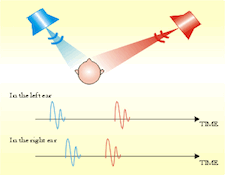It’s the time of year for saving money!
I read recently that “…a rather disturbing fact [is] that our hearing deteriorates with age” and that “this is especially significant at the higher frequencies.” The article went on to say that “…by the sixties most people have difficulty in hearing sound above 12 KHz”; and that “25% of a population may have a threshold over 15 dB above the minimum (hearing loss of 15 dB) and 10% over 25 dB above.”
 Well, at my age, that must make me flat-out stone deaf, but if it does, I haven’t noticed. And neither did the people at the Newport Audio Show and the California Audio Show who asked me to set up their speakers for them for the best sound and imaging and then liked the results when I did.
Well, at my age, that must make me flat-out stone deaf, but if it does, I haven’t noticed. And neither did the people at the Newport Audio Show and the California Audio Show who asked me to set up their speakers for them for the best sound and imaging and then liked the results when I did.
I really DID, though, worry about my hearing when I first read that, and I DID sort of freak-out a little: What if I really can’t hear as well as I used to? What will that do to my ability to enjoy music? Or audio gear? Or even to continue writing these articles? And then I remembered smoking.
I started smoking when I was about seventeen (and also grew a beard) for just one specific purpose: There was great folk music and jazz to be heard in Los Angeles in those days, but it was always at clubs or other venues where you had to be twenty-one to get in, so, lacking an appropriate fake ID, I grew a beard and started wearing suits and smoking cigars to look older. It worked most of the time, and even after I attained legal age and no longer needed it, I kept on smoking. I also, for most of the time since then, have kept the beard, but, after having my fill of playing executive fashion plate (at one time I owned 23 suits, and could have taught GQ a thing or two), I ditched the suits entirely.
When, forty years or so later, I finally quit smoking (all at once, unassisted, after maybe a thousand tries) I expected that my health, my “wind”, and my sense of taste would get better, AND MAYBE THEY DID. But, like the presumed decline of my hearing ability to its present level, if it happened at all, it happened in such tiny daily or weekly increments, over such an extended period of time that I never noticed it, and, for all intents and purposes, it might just as well have never happened at all
The fact, though, is that what I hear today is what I hear today, and NOT what I could hear as a child or even as a young man. And when I’m listening to a system – even when I’m critically listening, and not just listening to enjoy the music – what I’m comparing its sound to is not the sound of music as I heard it long ago, but the sound of music as I hear it today.
 In short, to me, my golden ears are still golden and I can even tell you why that’s true: The first reason is simple; it’s what I call the “rose-colored glasses effect”. If you see the world through rose-colored glasses, and you ALWAYS do that, and have done it for so long that you can’t remember ever seeing the world in any other way, for you, the world has a rose-colored tint and all of the objects in it do too, and it will make absolutely no difference to your overall perception of what you see: The difference between black and green, just to cite one example, when both colors are seen through rose-colored filters will be exactly the same as the difference between those two colors when they’re seen with the filters removed. Other thing that will be the same are the relative size and positioning of what you see: the “black” object and the “green” object, whatever they may actually be or whatever their actual color, will still be exactly the same size and in exactly the same positions relative to each other and to their surroundings whether I’m wearing colored lenses or not. In short, as regards those aspects of my perception of the world, whether I wear colored glasses or not makes absolutely no difference at all, and the same thing exactly applies to audio.
In short, to me, my golden ears are still golden and I can even tell you why that’s true: The first reason is simple; it’s what I call the “rose-colored glasses effect”. If you see the world through rose-colored glasses, and you ALWAYS do that, and have done it for so long that you can’t remember ever seeing the world in any other way, for you, the world has a rose-colored tint and all of the objects in it do too, and it will make absolutely no difference to your overall perception of what you see: The difference between black and green, just to cite one example, when both colors are seen through rose-colored filters will be exactly the same as the difference between those two colors when they’re seen with the filters removed. Other thing that will be the same are the relative size and positioning of what you see: the “black” object and the “green” object, whatever they may actually be or whatever their actual color, will still be exactly the same size and in exactly the same positions relative to each other and to their surroundings whether I’m wearing colored lenses or not. In short, as regards those aspects of my perception of the world, whether I wear colored glasses or not makes absolutely no difference at all, and the same thing exactly applies to audio.
Anthony H. Cordesman (“AHC”) — among other things, a reviewer for the absolute sound — provided confirmation of that when, years ago, he disclosed that among the members of the “Listening Panel” who helped him to evaluate equipment for his reviews, there was usually at least one person who was known to have only limited hearing ability and yet was able to make a meaningful contribution to the panel’s findings. Another example is Larry Kay, the publisher of, and reviewer for Fi Magazine, who admitted to being profoundly deaf in one ear and yet was able to write solid and believable equipment reviews – even claiming, by virtue of practice and other, perhaps phase or amplitude-related clues, to be able to perceive and judge imaging and soundstaging effects which logic would indicate should be impossible for him.
 The second reason is that, although a person’s (especially a man’s) ability to hear high frequencies does change – sometimes very greatly – as he gets older, there is much more to hearing than just frequency response. Especially for guys like me, for whom great soundstaging and imaging or life-like dynamics or transient attack and decay are the real joys and the greatest tests of a hi-fi system, simple frequency response may be of only secondary consequence, and the things that really “turn us on” may be more affected by arrival times (precedence effects), room acoustics, and other things that don’t change at all with advancing age.
The second reason is that, although a person’s (especially a man’s) ability to hear high frequencies does change – sometimes very greatly – as he gets older, there is much more to hearing than just frequency response. Especially for guys like me, for whom great soundstaging and imaging or life-like dynamics or transient attack and decay are the real joys and the greatest tests of a hi-fi system, simple frequency response may be of only secondary consequence, and the things that really “turn us on” may be more affected by arrival times (precedence effects), room acoustics, and other things that don’t change at all with advancing age.
In short, don’t worry about whether your ears are still as golden as they used to be. Both because of the “rose colored glasses effect” and the simple truth that many of the most important factors in determining our ability to hear sonic differences change little (if at all) with age, YOUR ABILITY TO TELL THE DIFFERENCE BETWEEN “LIVE” SOUND AND A RECORDING (Harry Pearson’s “absolute sound” standard) is probably very nearly as good now as it was when you were just a kid, and your ability to understand and appreciate whatever differences there may be is almost certainly even better.
Now go play with your system and enjoy!





